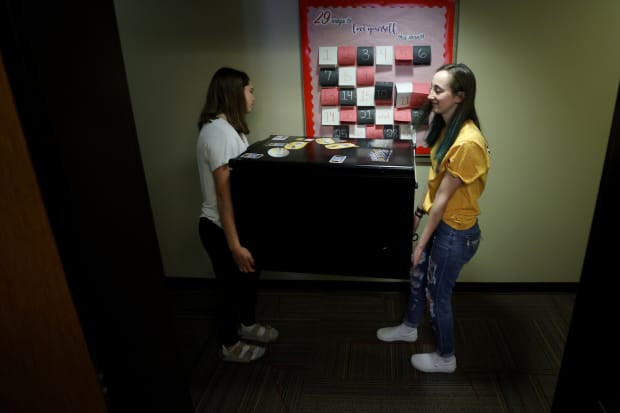
Students move out of their dorm at the University of Michigan in March. As fall approaches, some students are living off campus this fall, even if they’re taking their classes remotely. (Photo by Gregory Shamus/Getty Images)
Gregory Shamus/Getty Images
Like thousands of students across the country, Harlow Brooks has resigned herself to the fact that her first year of college will be different from what she expected.
The 19-year-old, who is beginning her film degree at the University of Southern California this fall, will be taking all of her classes online this first semester. Instead of meeting her fellow classmates walking from session to session at orientation, Brooks was introduced to them over Zoom.
But she’s not giving up on one aspect of the college experience — living among her peers. Though USC is encouraging undergraduates to reconsider living on or close to campus this fall, Brooks and her friends have created a dorm-like existence on their own. Brooks’ pod of eight formed after individual members met each other in big Zoom sessions that got smaller and smaller and eventually turned into a group chat.
They started sending each other Zillow Z, +5.12% listings for places to live together kind of as a joke and then realized they could make the jokes a reality. It took some effort, including a PowerPoint presentation and masked visits to potential housing options to convince their parents. But now, Brooks and three other women are renting an off-campus apartment in the same building as the other, four, male members of the group.

Harlow Brooks is planning to live with friends in off-campus housing this fall.
“If we are going to be isolated from the world, it might as well be really fun and we have each other,” Brooks said. The arrangement also allows them to avoid some of the less-pleasant rituals of dorm life, like schlepping towels and shower shoes to shared stalls.
“Even though it’s going to be so different than the traditional dorm experience I actually think it’s going to be a lot better in a lot of ways,” Brooks said. “Nobody is going to be moving somewhere where they don’t know anybody.”
Trend could mitigate any fallout for the student housing industry
A confluence of factors mean that Brooks’ decision may be a popular one, at least among some students, this fall even as many colleges are deciding to hold classes totally or largely online. That could be a boon — or at least mitigate any fallout — for the student housing industry, while higher education and other sectors are squeezed during the pandemic.
There are a variety of reasons why students still may show up to college towns to learn virtually. For one, students, who finished up high school or their spring college semester from their childhood bedrooms, are eager for their independence — and in many cases, their parents are eager to give it to them. In addition, living in their college towns allows students to capture some semblance of college life and attend classes or events easily if they suddenly resume in-person.
But perhaps most practically, many returning students signed leases for off-campus housing months ago — industry experts say landlords that specialize in student housing are typically signing up tenants beginning in October of the previous year — and are loath to let that money go, even if they won’t be attending classes in person.
“Most of those leases are signed,” said Barbara Denham, senior economist at Moody’s Analytics’ REIS. “It’s an odd property type in that leases are signed a year in advance.”
Pre-leasing activity is down some from this time last year
In June, apartment buildings that cater to students but aren’t owned by universities, reported occupancy levels of 74.9% for fall 2020, according to data from RealPage, a property management software company. That’s down slightly from this time last year when so-called pre-lease occupancy was at 79%, Real Page found.
“Off-campus housing is extremely well-positioned as a desirable consumer product in a pandemic environment,” said Bill Bayless, the chief executive officer of American Campus Communities ACC, , a major developer, owner and manager of student housing communities.
Bayless’ firm is betting that students and parents will prefer housing that’s more like a typical apartment than a dorm — there’s rarely a communal bathroom or kitchen in off-campus student housing, though students do frequently share bedrooms.
Still, students who live off-campus, won’t be under the auspices of their colleges and whatever protocols they’ve put in place in their residence halls. ACC is partnering with RB RB, -1.85%, the makers of Lysol, to develop a program — called, “Be safe. Be smart. Do your part. with Lysol Protection,” — that will include reminding residents of ways to help stop the spread of the virus, educating them on which products to use, and providing staff with protocol and products to ensure communal spaces are properly cleaned.
One of the company’s buildings had a COVID outbreak in early summer where 41 residents contracted the virus, Bayless disclosed on a July earnings call. The residents quarantined and as of June 29, there were no cases reported in that property, he said.
So far, 90.1% of ACC’s beds are leased for the coming academic year. That’s compared to a pre-lease rate of 93.5% at this time last year, the company announced in July as part of its second quarter earnings report. At properties serving campuses that have announced they’ll be fully virtual, ACC’s prelease activity is at 90%, according to the July earnings call, with no-shows and requests to break leases representing a potentially 5% decrease in occupancy.
That some students still want to be near their universities regardless of how their classes are delivered is “encouraging” for the off-campus housing industry, said Jennifer Cassidy, executive vice president and chief operating officer at Campus Advantage, a property management company that specializes in student housing.
“Even if there are colleges that in the long-term do move to more virtual, students want to be around their peers and they want to be in-market,” she said.
When the pandemic first began, it wasn’t quite clear how students and families would approach the idea of living near campus. In March, Campus Advantage was “inundated with requests to break lease contracts,” Cassidy said. The company didn’t break lease contracts, but worked with tenants to provide deferred payment arrangements. For students who don’t want to return to their properties this fall, the company will provide them with available subleasing options, Cassidy said.
During the pandemic period so far, ACC provided $8.6 million in rent relief to residents of its off-campus buildings facing financial difficulty. There may be less of a need to provide relief this academic year because students’ financial aid packages — which include any loan or grant money they might use for off-campus housing — will more closely match their family’s current financial circumstances, Bayless said.
In April and May, shortly after colleges sent students home and before they started announcing their plans for the fall en masse, off-campus housing operators saw less interest than typical in signing leases for the upcoming year, according to Real Page. But leasing activity started to pick back up in June. At ACC, the company is predicting that the number of residents who either don’t show up or request to be let out of their leases will be higher than last year, according to the July earnings call.
Still, Bayless said he’s “cautiously optimistic” the company could experience a “late surge” in the leasing season as fall nears. In many cases, universities that are opening their residence halls are doing so at reduced capacity, pushing students who might have lived in dorms to look elsewhere.
Carl Whitaker, market analytics senior manager, at RealPage, wrote in an email that those trends could “result in some spillover demand,” for the off-campus housing industry as a whole.
Never considered living off-campus before the pandemic
Before the pandemic hit, Lelia Saffold had never considered that she would live off-campus this year. Typically, her school, Meredith College in Raleigh, N.C., requires freshmen and sophomores to live on campus. But in late June, school officials announced that in light of the pandemic, they’d be relaxing that requirement. Saffold and her potential roommates hustled to find housing.
“It was a little stressful,” Saffold said of the experience in early July. “There’s a whole rush of students who are trying to find apartments and leases were filling up really quickly. Within a day or two we had to find this complex and apply and sign for a lease.”

Harlow Brooks is planning to live with friends in off-campus housing this fall.
Saffold and her roommate were able to find an apartment they’re happy with. In addition, they’re in agreement about the pandemic-related rules they’ll be observing in the apartment: They’re limiting themselves essentially to one guest each for the entirety of the semester and those guests will have to wear masks inside the apartment.
Though the experience won’t be much like traditional college living, Saffold knew that after months at home with her mom and stepdad she wanted to be back near campus for school. For one, as a dance major, she will be attending the occasional class in-person. In addition, having her own space and some independence will help her be in the right mindset for school, even if most of her courses are online.
Still, before Meredith’s announcement, Saffold was worried about the prospect of living in a dorm this year.
“As much fun as it is and as much of a community as it is, it’s like a petri dish for germs,” Saffold said of dorms. “As soon as one person on the hall gets sick, everybody gets sick.”
Fewer students in dorms could exacerbate colleges’ financial challenges
Having fewer students in dorms this fall is likely to exacerbate colleges’ financial challenges. Small, private schools, whose business models’ were showing signs of cracking even before the pandemic, rely on housing as a key source of revenue, said Kevin McClure, an associate professor of higher education at University of North Carolina Wilmington.
For these schools, “the idea of not having students on campus for another semester paying for housing feels catastrophic,” he said.
Even at larger universities where housing facilities are essentially self-sustaining entities with their own balance sheets, in a scenario where the buildings are generating less revenue than expected, universities may have to kick in to cover costs, he said.
Perhaps more broadly, housing availability may influence whether students enroll and tuition is a major source of funds for most schools. “Housing is a key ingredient in basically a residential campus experience happening at all,” McClure said.
Some schools have argued that extends to off-campus housing as well. At Cornell University, officials decided to bring students back to campus for the fall, in part because they believed students would come to Ithaca, New York, where Cornell is based, and life off-campus, even if courses were completely virtual.
“In that scenario, Cornell would have had no authority to mandate testing or restrict students’ behavior,” the university said in a release.
“It demonstrates an acknowledgement that at these bigger universities that have surrounding towns that are housing college students, colleges can say for all intents and purposes that is a private community where we don’t have jurisdiction,” McClure said of Cornell’s and other, similar decisions.
Watching campus culture closely
Parthi Dasondi, 20, will be watching the bar and frat culture closely at Rutgers University this fall when she moves to New Brunswick, New Jersey, where one of the school’s campuses is located, for her senior year. The school announced in July that it would be offering basically all of its coursework online and severely limiting capacity in on-campus housing.
Still, like in any town, local bars remain open with outdoor-only seating and if students resume their pre-COVID patterns of frequenting those watering holes and large gatherings at fraternity houses and other locations “incessantly” then it could change her plans, Dasondi said. But she’s optimistic that students can return to New Brunswick and stay safe.
“If there were to be a really bad outbreak at Rutgers-New Brunswick that’s when I would consider going back home,” she said. “I hope that it doesn’t come to me moving back home.”

Parthi Dasondi rushed to find off-campus housing for this fall after her school announced it would be offering very limited housing on campus.
Dasondi, a biological sciences major and cognitive science and creative writing double minor, spent the last two years commuting from her parents’ house in Edison, N.J., and was looking forward to a senior year in New Brunswick. She’d signed up to live on campus with roommates, but once the school made their decision on the fall semester, she found herself scrambling to find off-campus housing.
Now it looks likely she’ll live in an off-campus house with four roommates. They’re currently negotiating the rent. Under typical circumstances, there’d be little room to negotiate — the house is in a prime location near a good stop on the college’s shuttle route. But given that classes are remote, “we don’t need to use those anymore,” Dasondi said. The women are hoping they’ll have some leverage since it’s likely not as many students will come to New Brunswick this fall.
Dasondi said she’s committed to spending this year near her college. “When you’re at an age where you’re growing up and looking for more independence, [living at home] is not something that’s going to help you grow,” she said.
Dasondi and her roommates plan to get tested for COVID-19 and quarantine before they move in and they also plan to discuss the precautions they’ll be taking to protect themselves and their community from the virus — plans that they’ll continue to discuss and evaluate once they live together.
“I want to be able to say I was safe during the pandemic and I still got to have my senior year,” she said.